University Biology Report: Mindfulness Influence on Short-Term Memory
VerifiedAdded on 2023/06/07
|12
|2757
|311
Report
AI Summary
This report investigates the effects of mindfulness on working memory performance, drawing upon an annotated bibliography of five peer-reviewed scientific journal articles and one literature review published between 2014 and 2018. The report explores the relationship between mindfulness practices and cognitive resilience, examining how mindfulness training can mitigate the negative impacts of demanding tasks on working memory. Key studies analyzed include research on short-form mindfulness training's impact on cognitive resilience, the association between trait mindfulness and attentional constructs, the enhancement of episodic memory through mindfulness, the efficacy of mindfulness meditation on working memory capacity in adolescents, and the effects of mindfulness meditation on conscious and non-conscious components of the mind. The report synthesizes findings from these studies to provide an in-depth understanding of mindfulness's role in enhancing memory performance and cognitive function, offering insights into the potential benefits of mindfulness interventions in various contexts.
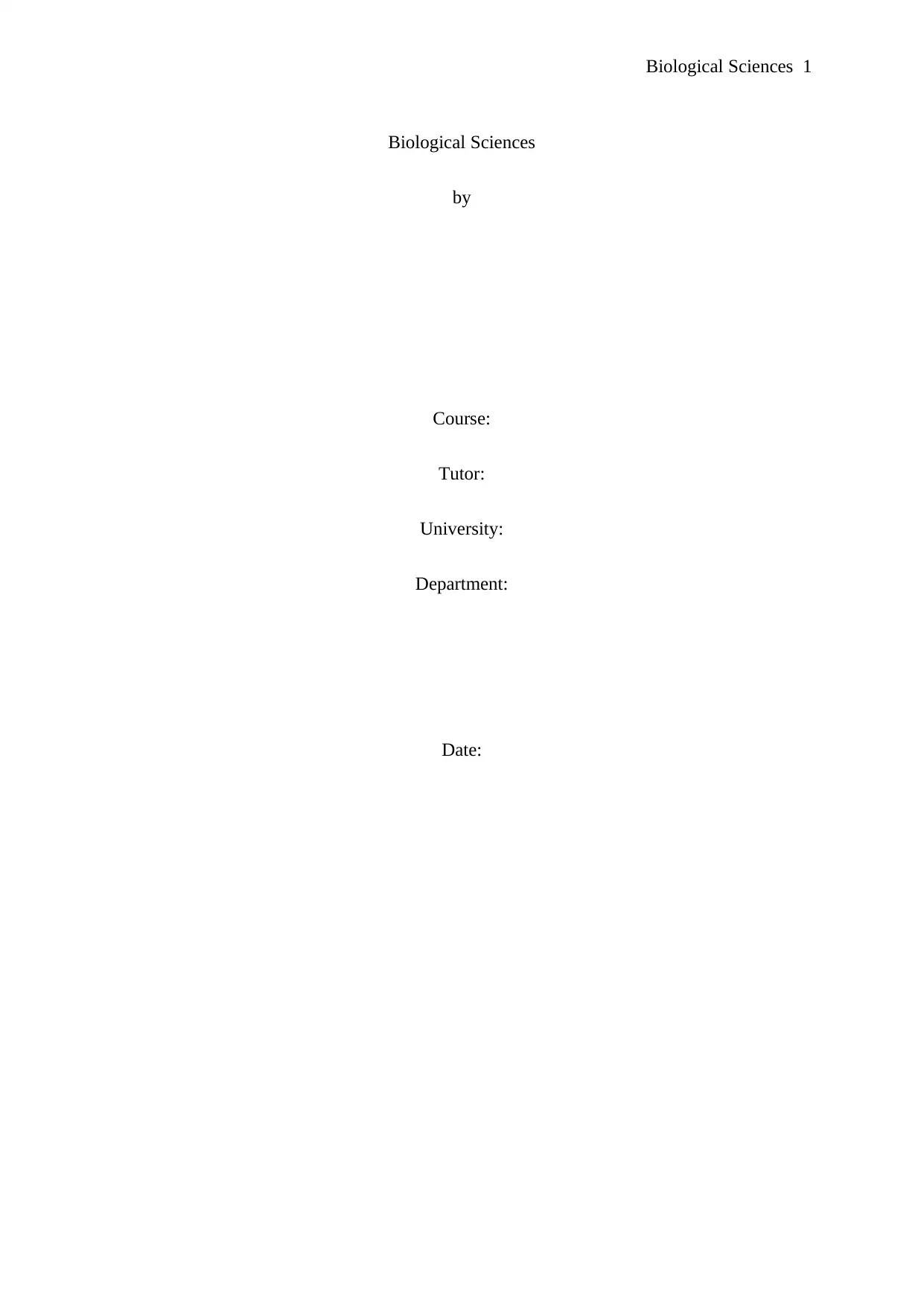
Biological Sciences 1
Biological Sciences
by
Course:
Tutor:
University:
Department:
Date:
Biological Sciences
by
Course:
Tutor:
University:
Department:
Date:
Paraphrase This Document
Need a fresh take? Get an instant paraphrase of this document with our AI Paraphraser
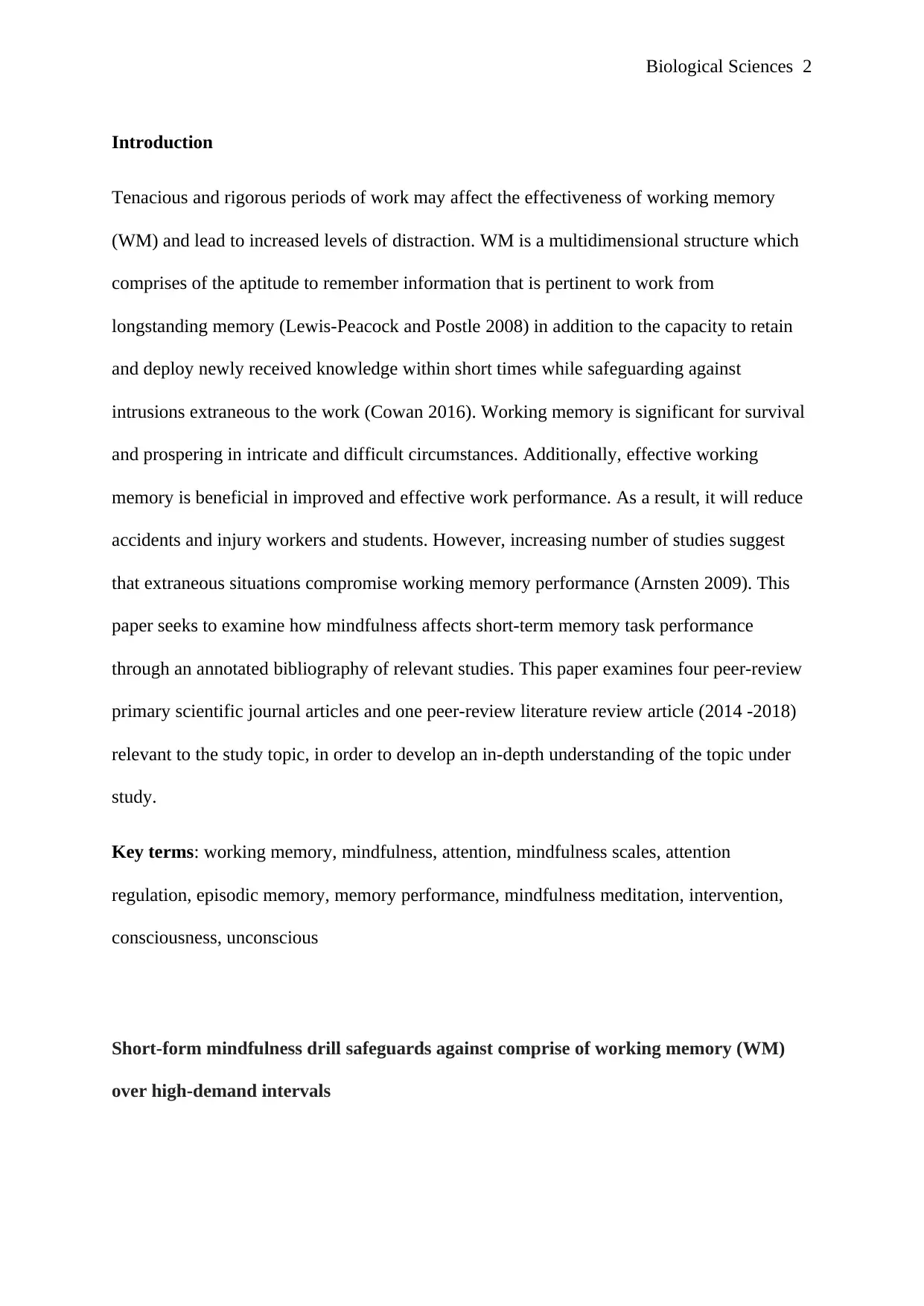
Biological Sciences 2
Introduction
Tenacious and rigorous periods of work may affect the effectiveness of working memory
(WM) and lead to increased levels of distraction. WM is a multidimensional structure which
comprises of the aptitude to remember information that is pertinent to work from
longstanding memory (Lewis-Peacock and Postle 2008) in addition to the capacity to retain
and deploy newly received knowledge within short times while safeguarding against
intrusions extraneous to the work (Cowan 2016). Working memory is significant for survival
and prospering in intricate and difficult circumstances. Additionally, effective working
memory is beneficial in improved and effective work performance. As a result, it will reduce
accidents and injury workers and students. However, increasing number of studies suggest
that extraneous situations compromise working memory performance (Arnsten 2009). This
paper seeks to examine how mindfulness affects short-term memory task performance
through an annotated bibliography of relevant studies. This paper examines four peer-review
primary scientific journal articles and one peer-review literature review article (2014 -2018)
relevant to the study topic, in order to develop an in-depth understanding of the topic under
study.
Key terms: working memory, mindfulness, attention, mindfulness scales, attention
regulation, episodic memory, memory performance, mindfulness meditation, intervention,
consciousness, unconscious
Short-form mindfulness drill safeguards against comprise of working memory (WM)
over high-demand intervals
Introduction
Tenacious and rigorous periods of work may affect the effectiveness of working memory
(WM) and lead to increased levels of distraction. WM is a multidimensional structure which
comprises of the aptitude to remember information that is pertinent to work from
longstanding memory (Lewis-Peacock and Postle 2008) in addition to the capacity to retain
and deploy newly received knowledge within short times while safeguarding against
intrusions extraneous to the work (Cowan 2016). Working memory is significant for survival
and prospering in intricate and difficult circumstances. Additionally, effective working
memory is beneficial in improved and effective work performance. As a result, it will reduce
accidents and injury workers and students. However, increasing number of studies suggest
that extraneous situations compromise working memory performance (Arnsten 2009). This
paper seeks to examine how mindfulness affects short-term memory task performance
through an annotated bibliography of relevant studies. This paper examines four peer-review
primary scientific journal articles and one peer-review literature review article (2014 -2018)
relevant to the study topic, in order to develop an in-depth understanding of the topic under
study.
Key terms: working memory, mindfulness, attention, mindfulness scales, attention
regulation, episodic memory, memory performance, mindfulness meditation, intervention,
consciousness, unconscious
Short-form mindfulness drill safeguards against comprise of working memory (WM)
over high-demand intervals
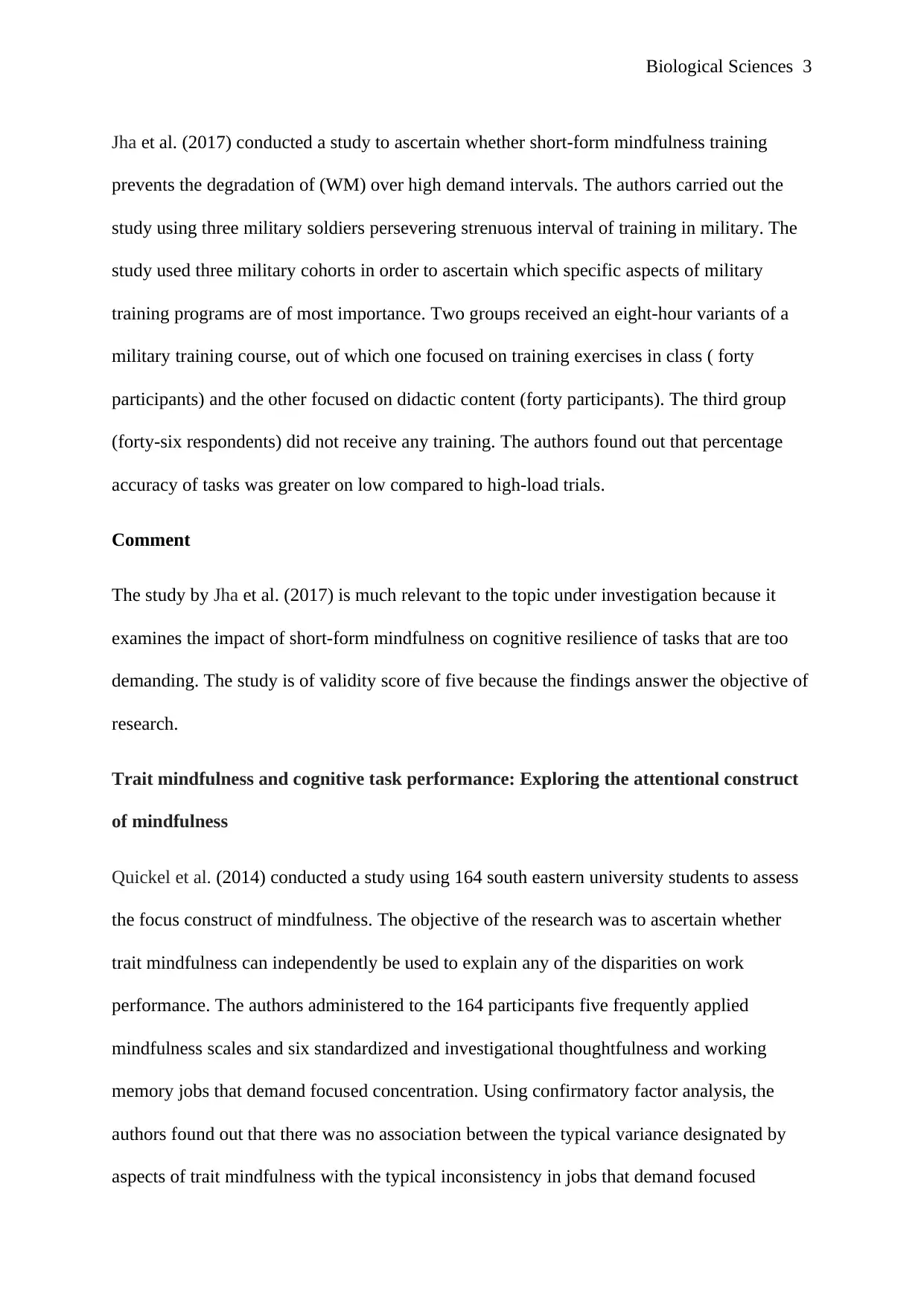
Biological Sciences 3
Jha et al. (2017) conducted a study to ascertain whether short-form mindfulness training
prevents the degradation of (WM) over high demand intervals. The authors carried out the
study using three military soldiers persevering strenuous interval of training in military. The
study used three military cohorts in order to ascertain which specific aspects of military
training programs are of most importance. Two groups received an eight-hour variants of a
military training course, out of which one focused on training exercises in class ( forty
participants) and the other focused on didactic content (forty participants). The third group
(forty-six respondents) did not receive any training. The authors found out that percentage
accuracy of tasks was greater on low compared to high-load trials.
Comment
The study by Jha et al. (2017) is much relevant to the topic under investigation because it
examines the impact of short-form mindfulness on cognitive resilience of tasks that are too
demanding. The study is of validity score of five because the findings answer the objective of
research.
Trait mindfulness and cognitive task performance: Exploring the attentional construct
of mindfulness
Quickel et al. (2014) conducted a study using 164 south eastern university students to assess
the focus construct of mindfulness. The objective of the research was to ascertain whether
trait mindfulness can independently be used to explain any of the disparities on work
performance. The authors administered to the 164 participants five frequently applied
mindfulness scales and six standardized and investigational thoughtfulness and working
memory jobs that demand focused concentration. Using confirmatory factor analysis, the
authors found out that there was no association between the typical variance designated by
aspects of trait mindfulness with the typical inconsistency in jobs that demand focused
Jha et al. (2017) conducted a study to ascertain whether short-form mindfulness training
prevents the degradation of (WM) over high demand intervals. The authors carried out the
study using three military soldiers persevering strenuous interval of training in military. The
study used three military cohorts in order to ascertain which specific aspects of military
training programs are of most importance. Two groups received an eight-hour variants of a
military training course, out of which one focused on training exercises in class ( forty
participants) and the other focused on didactic content (forty participants). The third group
(forty-six respondents) did not receive any training. The authors found out that percentage
accuracy of tasks was greater on low compared to high-load trials.
Comment
The study by Jha et al. (2017) is much relevant to the topic under investigation because it
examines the impact of short-form mindfulness on cognitive resilience of tasks that are too
demanding. The study is of validity score of five because the findings answer the objective of
research.
Trait mindfulness and cognitive task performance: Exploring the attentional construct
of mindfulness
Quickel et al. (2014) conducted a study using 164 south eastern university students to assess
the focus construct of mindfulness. The objective of the research was to ascertain whether
trait mindfulness can independently be used to explain any of the disparities on work
performance. The authors administered to the 164 participants five frequently applied
mindfulness scales and six standardized and investigational thoughtfulness and working
memory jobs that demand focused concentration. Using confirmatory factor analysis, the
authors found out that there was no association between the typical variance designated by
aspects of trait mindfulness with the typical inconsistency in jobs that demand focused
⊘ This is a preview!⊘
Do you want full access?
Subscribe today to unlock all pages.

Trusted by 1+ million students worldwide
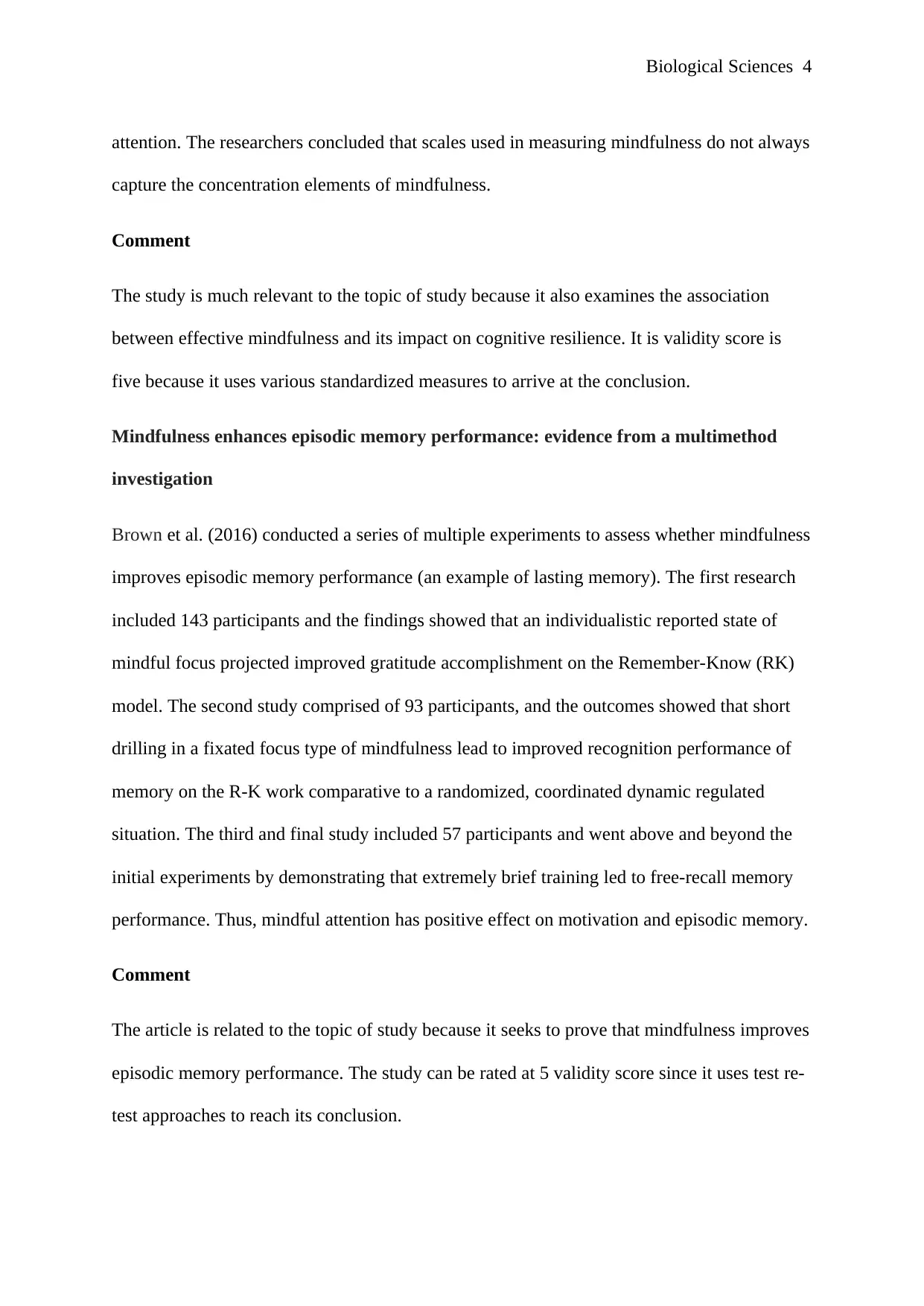
Biological Sciences 4
attention. The researchers concluded that scales used in measuring mindfulness do not always
capture the concentration elements of mindfulness.
Comment
The study is much relevant to the topic of study because it also examines the association
between effective mindfulness and its impact on cognitive resilience. It is validity score is
five because it uses various standardized measures to arrive at the conclusion.
Mindfulness enhances episodic memory performance: evidence from a multimethod
investigation
Brown et al. (2016) conducted a series of multiple experiments to assess whether mindfulness
improves episodic memory performance (an example of lasting memory). The first research
included 143 participants and the findings showed that an individualistic reported state of
mindful focus projected improved gratitude accomplishment on the Remember-Know (RK)
model. The second study comprised of 93 participants, and the outcomes showed that short
drilling in a fixated focus type of mindfulness lead to improved recognition performance of
memory on the R-K work comparative to a randomized, coordinated dynamic regulated
situation. The third and final study included 57 participants and went above and beyond the
initial experiments by demonstrating that extremely brief training led to free-recall memory
performance. Thus, mindful attention has positive effect on motivation and episodic memory.
Comment
The article is related to the topic of study because it seeks to prove that mindfulness improves
episodic memory performance. The study can be rated at 5 validity score since it uses test re-
test approaches to reach its conclusion.
attention. The researchers concluded that scales used in measuring mindfulness do not always
capture the concentration elements of mindfulness.
Comment
The study is much relevant to the topic of study because it also examines the association
between effective mindfulness and its impact on cognitive resilience. It is validity score is
five because it uses various standardized measures to arrive at the conclusion.
Mindfulness enhances episodic memory performance: evidence from a multimethod
investigation
Brown et al. (2016) conducted a series of multiple experiments to assess whether mindfulness
improves episodic memory performance (an example of lasting memory). The first research
included 143 participants and the findings showed that an individualistic reported state of
mindful focus projected improved gratitude accomplishment on the Remember-Know (RK)
model. The second study comprised of 93 participants, and the outcomes showed that short
drilling in a fixated focus type of mindfulness lead to improved recognition performance of
memory on the R-K work comparative to a randomized, coordinated dynamic regulated
situation. The third and final study included 57 participants and went above and beyond the
initial experiments by demonstrating that extremely brief training led to free-recall memory
performance. Thus, mindful attention has positive effect on motivation and episodic memory.
Comment
The article is related to the topic of study because it seeks to prove that mindfulness improves
episodic memory performance. The study can be rated at 5 validity score since it uses test re-
test approaches to reach its conclusion.
Paraphrase This Document
Need a fresh take? Get an instant paraphrase of this document with our AI Paraphraser
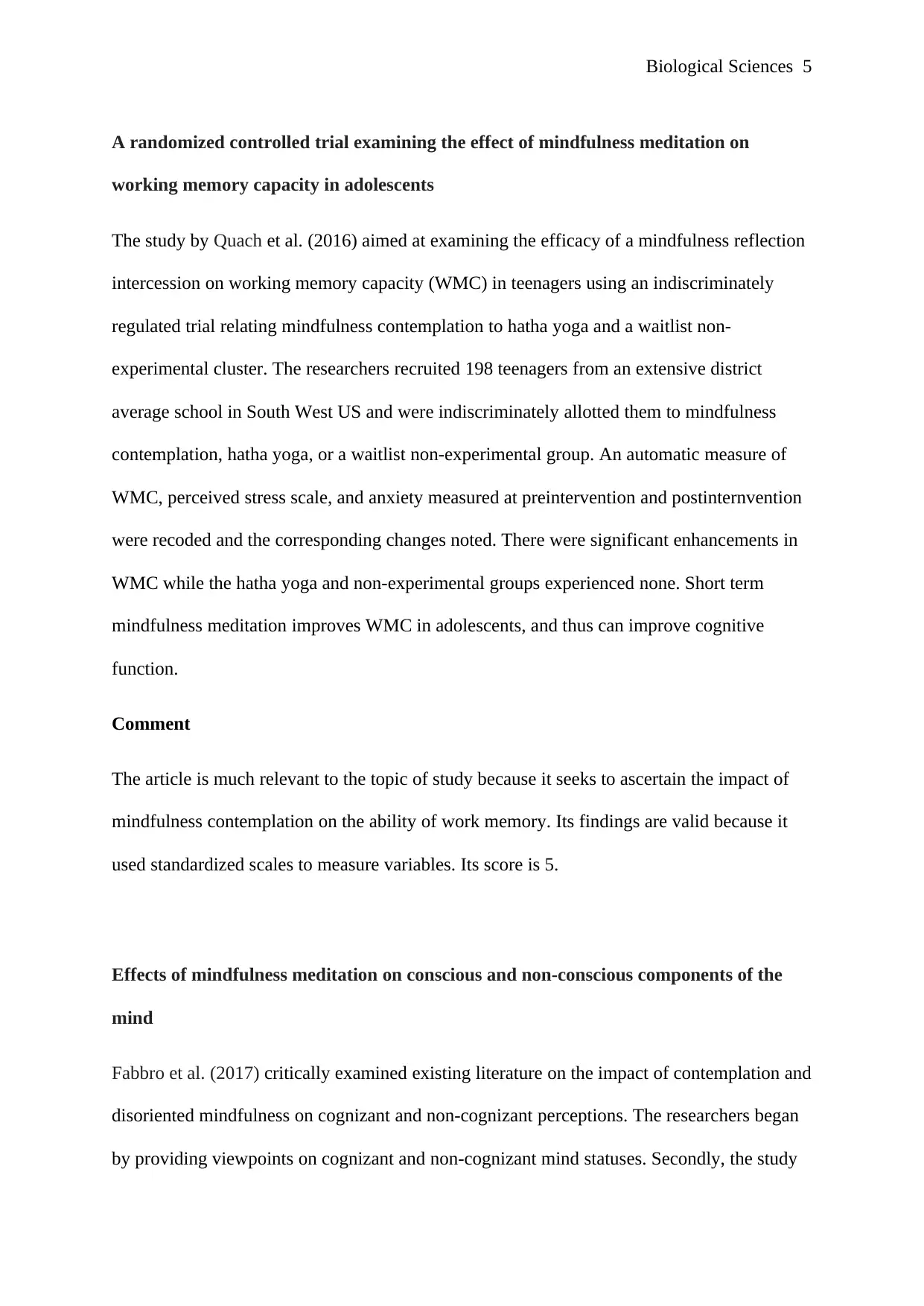
Biological Sciences 5
A randomized controlled trial examining the effect of mindfulness meditation on
working memory capacity in adolescents
The study by Quach et al. (2016) aimed at examining the efficacy of a mindfulness reflection
intercession on working memory capacity (WMC) in teenagers using an indiscriminately
regulated trial relating mindfulness contemplation to hatha yoga and a waitlist non-
experimental cluster. The researchers recruited 198 teenagers from an extensive district
average school in South West US and were indiscriminately allotted them to mindfulness
contemplation, hatha yoga, or a waitlist non-experimental group. An automatic measure of
WMC, perceived stress scale, and anxiety measured at preintervention and postinternvention
were recoded and the corresponding changes noted. There were significant enhancements in
WMC while the hatha yoga and non-experimental groups experienced none. Short term
mindfulness meditation improves WMC in adolescents, and thus can improve cognitive
function.
Comment
The article is much relevant to the topic of study because it seeks to ascertain the impact of
mindfulness contemplation on the ability of work memory. Its findings are valid because it
used standardized scales to measure variables. Its score is 5.
Effects of mindfulness meditation on conscious and non-conscious components of the
mind
Fabbro et al. (2017) critically examined existing literature on the impact of contemplation and
disoriented mindfulness on cognizant and non-cognizant perceptions. The researchers began
by providing viewpoints on cognizant and non-cognizant mind statuses. Secondly, the study
A randomized controlled trial examining the effect of mindfulness meditation on
working memory capacity in adolescents
The study by Quach et al. (2016) aimed at examining the efficacy of a mindfulness reflection
intercession on working memory capacity (WMC) in teenagers using an indiscriminately
regulated trial relating mindfulness contemplation to hatha yoga and a waitlist non-
experimental cluster. The researchers recruited 198 teenagers from an extensive district
average school in South West US and were indiscriminately allotted them to mindfulness
contemplation, hatha yoga, or a waitlist non-experimental group. An automatic measure of
WMC, perceived stress scale, and anxiety measured at preintervention and postinternvention
were recoded and the corresponding changes noted. There were significant enhancements in
WMC while the hatha yoga and non-experimental groups experienced none. Short term
mindfulness meditation improves WMC in adolescents, and thus can improve cognitive
function.
Comment
The article is much relevant to the topic of study because it seeks to ascertain the impact of
mindfulness contemplation on the ability of work memory. Its findings are valid because it
used standardized scales to measure variables. Its score is 5.
Effects of mindfulness meditation on conscious and non-conscious components of the
mind
Fabbro et al. (2017) critically examined existing literature on the impact of contemplation and
disoriented mindfulness on cognizant and non-cognizant perceptions. The researchers began
by providing viewpoints on cognizant and non-cognizant mind statuses. Secondly, the study
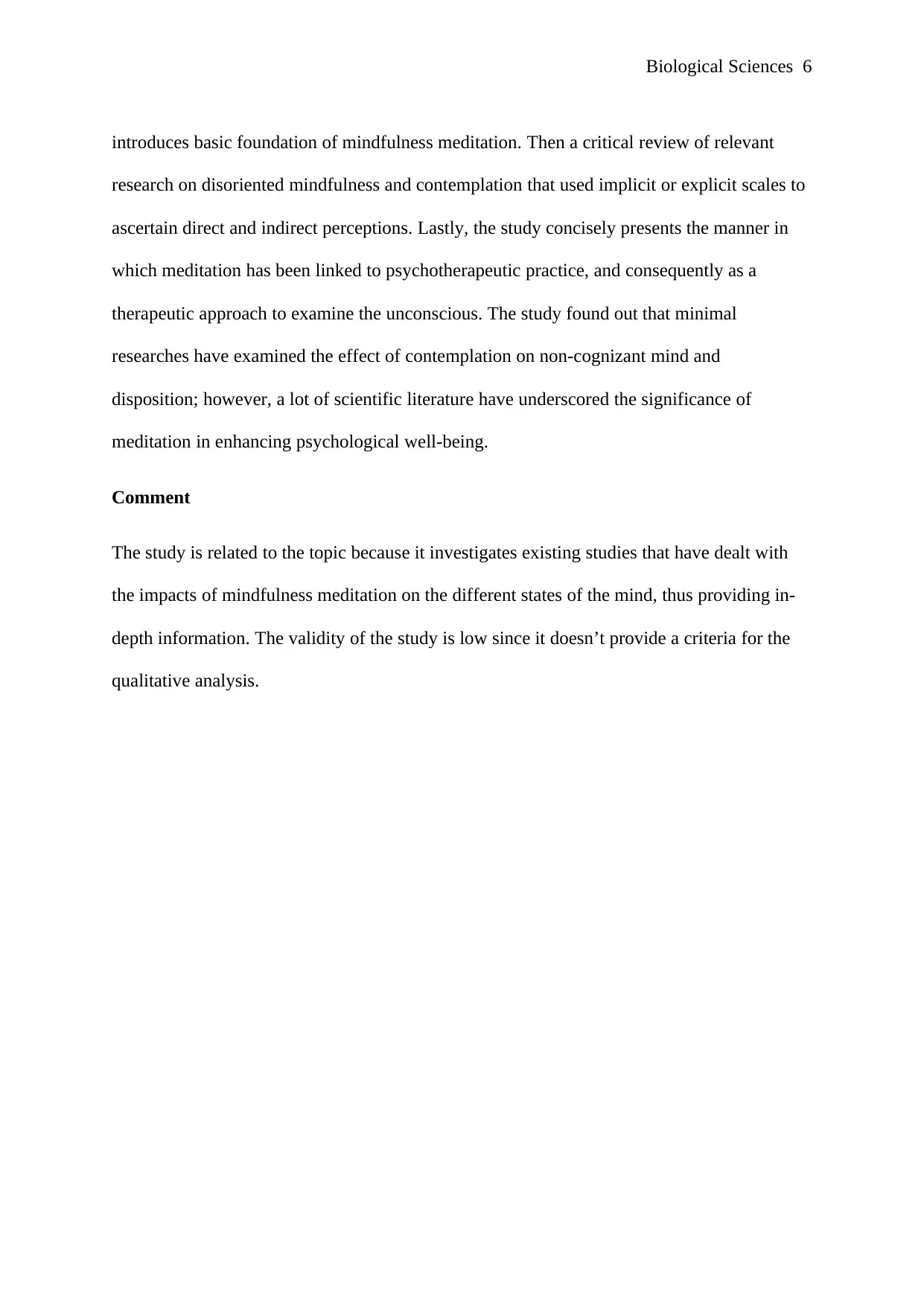
Biological Sciences 6
introduces basic foundation of mindfulness meditation. Then a critical review of relevant
research on disoriented mindfulness and contemplation that used implicit or explicit scales to
ascertain direct and indirect perceptions. Lastly, the study concisely presents the manner in
which meditation has been linked to psychotherapeutic practice, and consequently as a
therapeutic approach to examine the unconscious. The study found out that minimal
researches have examined the effect of contemplation on non-cognizant mind and
disposition; however, a lot of scientific literature have underscored the significance of
meditation in enhancing psychological well-being.
Comment
The study is related to the topic because it investigates existing studies that have dealt with
the impacts of mindfulness meditation on the different states of the mind, thus providing in-
depth information. The validity of the study is low since it doesn’t provide a criteria for the
qualitative analysis.
introduces basic foundation of mindfulness meditation. Then a critical review of relevant
research on disoriented mindfulness and contemplation that used implicit or explicit scales to
ascertain direct and indirect perceptions. Lastly, the study concisely presents the manner in
which meditation has been linked to psychotherapeutic practice, and consequently as a
therapeutic approach to examine the unconscious. The study found out that minimal
researches have examined the effect of contemplation on non-cognizant mind and
disposition; however, a lot of scientific literature have underscored the significance of
meditation in enhancing psychological well-being.
Comment
The study is related to the topic because it investigates existing studies that have dealt with
the impacts of mindfulness meditation on the different states of the mind, thus providing in-
depth information. The validity of the study is low since it doesn’t provide a criteria for the
qualitative analysis.
⊘ This is a preview!⊘
Do you want full access?
Subscribe today to unlock all pages.

Trusted by 1+ million students worldwide
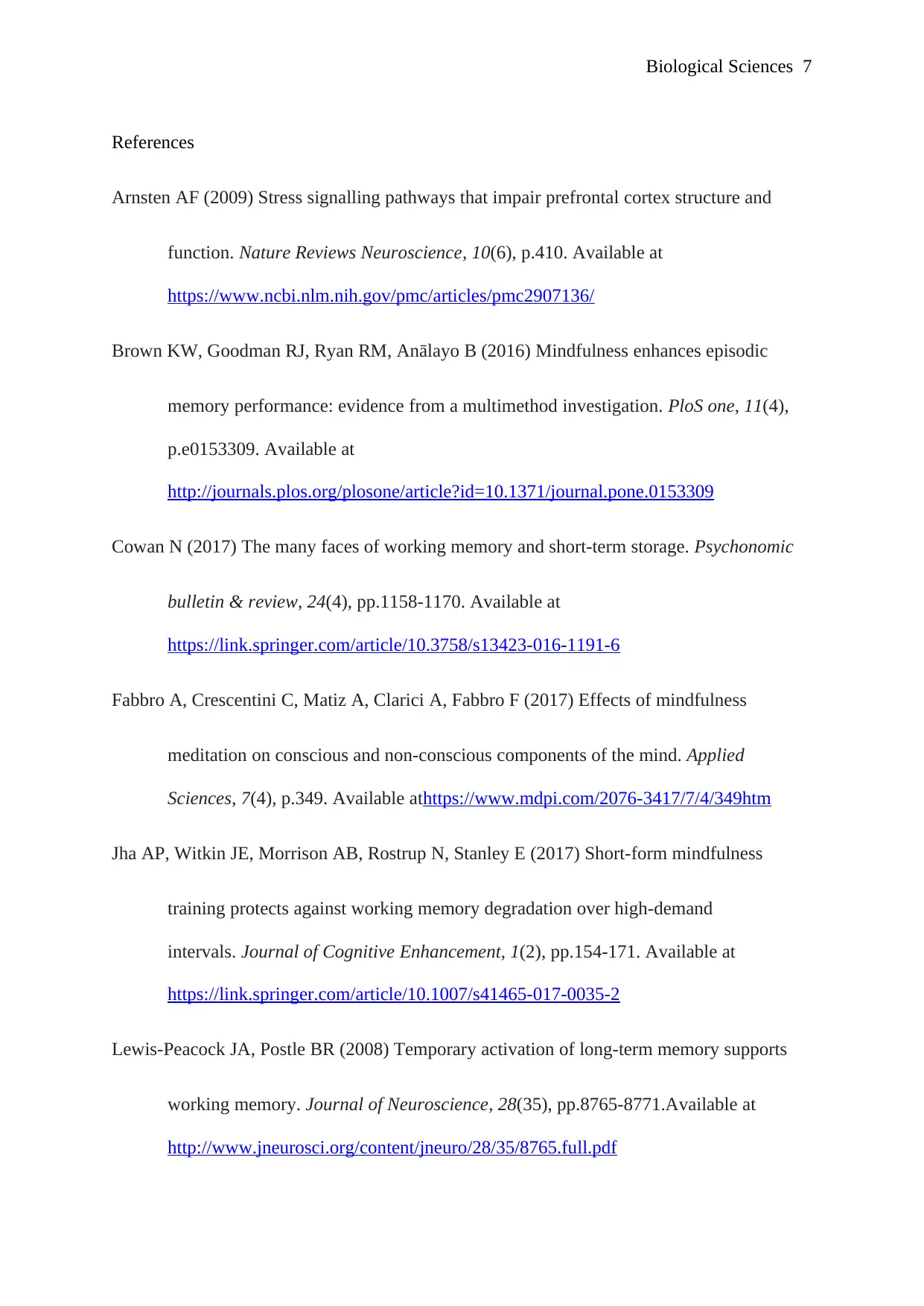
Biological Sciences 7
References
Arnsten AF (2009) Stress signalling pathways that impair prefrontal cortex structure and
function. Nature Reviews Neuroscience, 10(6), p.410. Available at
https://www.ncbi.nlm.nih.gov/pmc/articles/pmc2907136/
Brown KW, Goodman RJ, Ryan RM, Anālayo B (2016) Mindfulness enhances episodic
memory performance: evidence from a multimethod investigation. PloS one, 11(4),
p.e0153309. Available at
http://journals.plos.org/plosone/article?id=10.1371/journal.pone.0153309
Cowan N (2017) The many faces of working memory and short-term storage. Psychonomic
bulletin & review, 24(4), pp.1158-1170. Available at
https://link.springer.com/article/10.3758/s13423-016-1191-6
Fabbro A, Crescentini C, Matiz A, Clarici A, Fabbro F (2017) Effects of mindfulness
meditation on conscious and non-conscious components of the mind. Applied
Sciences, 7(4), p.349. Available athttps://www.mdpi.com/2076-3417/7/4/349htm
Jha AP, Witkin JE, Morrison AB, Rostrup N, Stanley E (2017) Short-form mindfulness
training protects against working memory degradation over high-demand
intervals. Journal of Cognitive Enhancement, 1(2), pp.154-171. Available at
https://link.springer.com/article/10.1007/s41465-017-0035-2
Lewis-Peacock JA, Postle BR (2008) Temporary activation of long-term memory supports
working memory. Journal of Neuroscience, 28(35), pp.8765-8771.Available at
http://www.jneurosci.org/content/jneuro/28/35/8765.full.pdf
References
Arnsten AF (2009) Stress signalling pathways that impair prefrontal cortex structure and
function. Nature Reviews Neuroscience, 10(6), p.410. Available at
https://www.ncbi.nlm.nih.gov/pmc/articles/pmc2907136/
Brown KW, Goodman RJ, Ryan RM, Anālayo B (2016) Mindfulness enhances episodic
memory performance: evidence from a multimethod investigation. PloS one, 11(4),
p.e0153309. Available at
http://journals.plos.org/plosone/article?id=10.1371/journal.pone.0153309
Cowan N (2017) The many faces of working memory and short-term storage. Psychonomic
bulletin & review, 24(4), pp.1158-1170. Available at
https://link.springer.com/article/10.3758/s13423-016-1191-6
Fabbro A, Crescentini C, Matiz A, Clarici A, Fabbro F (2017) Effects of mindfulness
meditation on conscious and non-conscious components of the mind. Applied
Sciences, 7(4), p.349. Available athttps://www.mdpi.com/2076-3417/7/4/349htm
Jha AP, Witkin JE, Morrison AB, Rostrup N, Stanley E (2017) Short-form mindfulness
training protects against working memory degradation over high-demand
intervals. Journal of Cognitive Enhancement, 1(2), pp.154-171. Available at
https://link.springer.com/article/10.1007/s41465-017-0035-2
Lewis-Peacock JA, Postle BR (2008) Temporary activation of long-term memory supports
working memory. Journal of Neuroscience, 28(35), pp.8765-8771.Available at
http://www.jneurosci.org/content/jneuro/28/35/8765.full.pdf
Paraphrase This Document
Need a fresh take? Get an instant paraphrase of this document with our AI Paraphraser
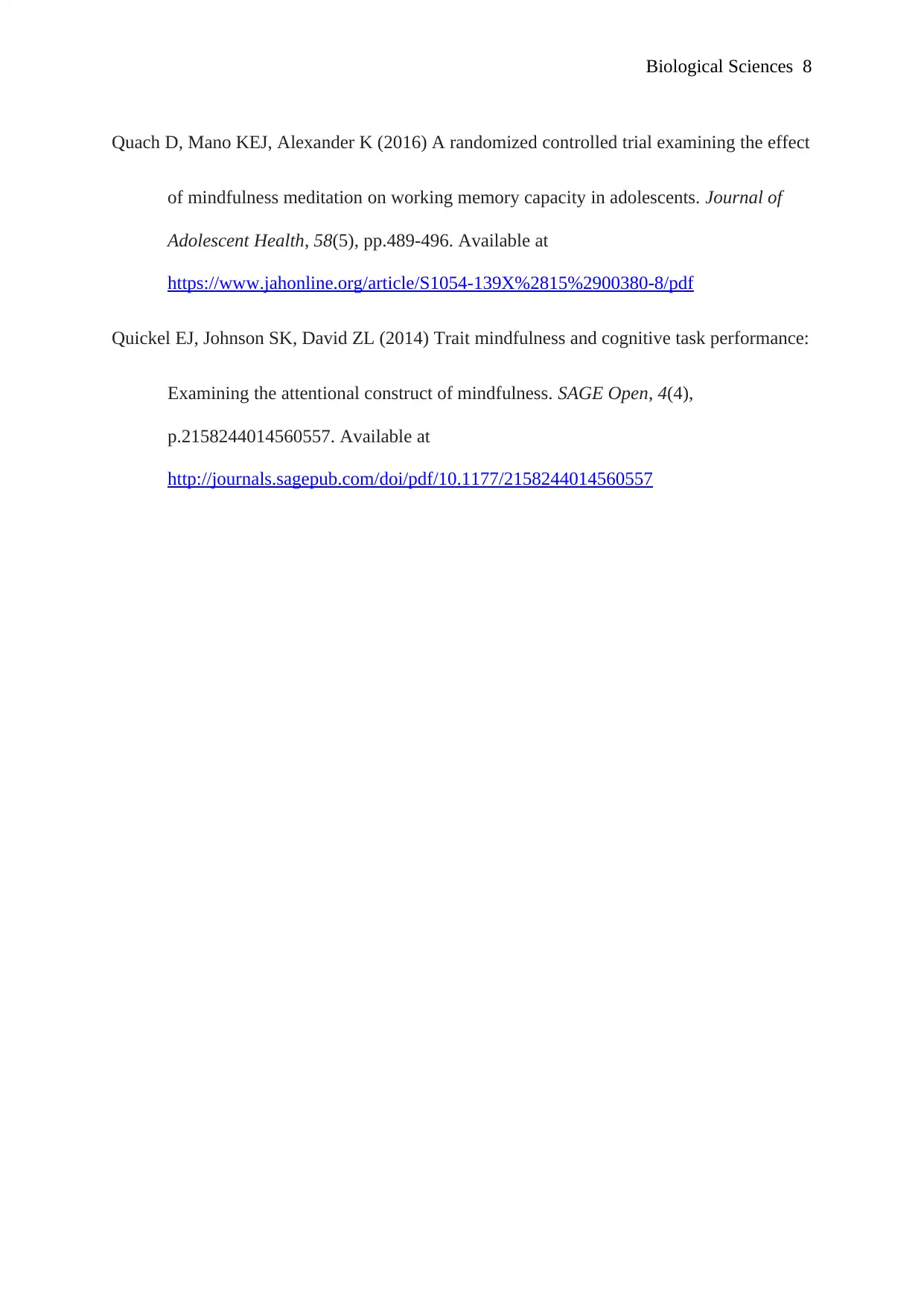
Biological Sciences 8
Quach D, Mano KEJ, Alexander K (2016) A randomized controlled trial examining the effect
of mindfulness meditation on working memory capacity in adolescents. Journal of
Adolescent Health, 58(5), pp.489-496. Available at
https://www.jahonline.org/article/S1054-139X%2815%2900380-8/pdf
Quickel EJ, Johnson SK, David ZL (2014) Trait mindfulness and cognitive task performance:
Examining the attentional construct of mindfulness. SAGE Open, 4(4),
p.2158244014560557. Available at
http://journals.sagepub.com/doi/pdf/10.1177/2158244014560557
Quach D, Mano KEJ, Alexander K (2016) A randomized controlled trial examining the effect
of mindfulness meditation on working memory capacity in adolescents. Journal of
Adolescent Health, 58(5), pp.489-496. Available at
https://www.jahonline.org/article/S1054-139X%2815%2900380-8/pdf
Quickel EJ, Johnson SK, David ZL (2014) Trait mindfulness and cognitive task performance:
Examining the attentional construct of mindfulness. SAGE Open, 4(4),
p.2158244014560557. Available at
http://journals.sagepub.com/doi/pdf/10.1177/2158244014560557
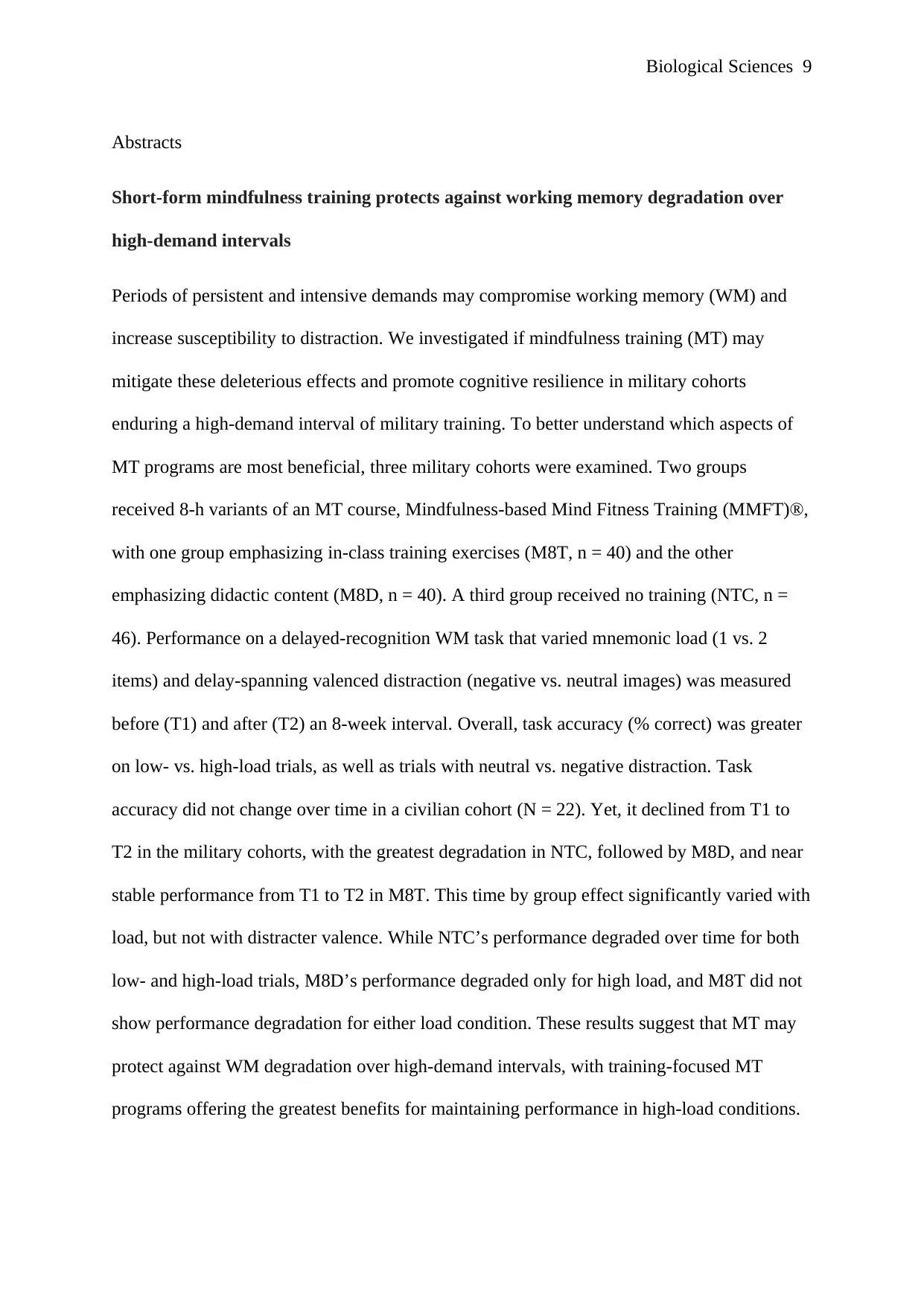
Biological Sciences 9
Abstracts
Short-form mindfulness training protects against working memory degradation over
high-demand intervals
Periods of persistent and intensive demands may compromise working memory (WM) and
increase susceptibility to distraction. We investigated if mindfulness training (MT) may
mitigate these deleterious effects and promote cognitive resilience in military cohorts
enduring a high-demand interval of military training. To better understand which aspects of
MT programs are most beneficial, three military cohorts were examined. Two groups
received 8-h variants of an MT course, Mindfulness-based Mind Fitness Training (MMFT)®,
with one group emphasizing in-class training exercises (M8T, n = 40) and the other
emphasizing didactic content (M8D, n = 40). A third group received no training (NTC, n =
46). Performance on a delayed-recognition WM task that varied mnemonic load (1 vs. 2
items) and delay-spanning valenced distraction (negative vs. neutral images) was measured
before (T1) and after (T2) an 8-week interval. Overall, task accuracy (% correct) was greater
on low- vs. high-load trials, as well as trials with neutral vs. negative distraction. Task
accuracy did not change over time in a civilian cohort (N = 22). Yet, it declined from T1 to
T2 in the military cohorts, with the greatest degradation in NTC, followed by M8D, and near
stable performance from T1 to T2 in M8T. This time by group effect significantly varied with
load, but not with distracter valence. While NTC’s performance degraded over time for both
low- and high-load trials, M8D’s performance degraded only for high load, and M8T did not
show performance degradation for either load condition. These results suggest that MT may
protect against WM degradation over high-demand intervals, with training-focused MT
programs offering the greatest benefits for maintaining performance in high-load conditions.
Abstracts
Short-form mindfulness training protects against working memory degradation over
high-demand intervals
Periods of persistent and intensive demands may compromise working memory (WM) and
increase susceptibility to distraction. We investigated if mindfulness training (MT) may
mitigate these deleterious effects and promote cognitive resilience in military cohorts
enduring a high-demand interval of military training. To better understand which aspects of
MT programs are most beneficial, three military cohorts were examined. Two groups
received 8-h variants of an MT course, Mindfulness-based Mind Fitness Training (MMFT)®,
with one group emphasizing in-class training exercises (M8T, n = 40) and the other
emphasizing didactic content (M8D, n = 40). A third group received no training (NTC, n =
46). Performance on a delayed-recognition WM task that varied mnemonic load (1 vs. 2
items) and delay-spanning valenced distraction (negative vs. neutral images) was measured
before (T1) and after (T2) an 8-week interval. Overall, task accuracy (% correct) was greater
on low- vs. high-load trials, as well as trials with neutral vs. negative distraction. Task
accuracy did not change over time in a civilian cohort (N = 22). Yet, it declined from T1 to
T2 in the military cohorts, with the greatest degradation in NTC, followed by M8D, and near
stable performance from T1 to T2 in M8T. This time by group effect significantly varied with
load, but not with distracter valence. While NTC’s performance degraded over time for both
low- and high-load trials, M8D’s performance degraded only for high load, and M8T did not
show performance degradation for either load condition. These results suggest that MT may
protect against WM degradation over high-demand intervals, with training-focused MT
programs offering the greatest benefits for maintaining performance in high-load conditions.
⊘ This is a preview!⊘
Do you want full access?
Subscribe today to unlock all pages.

Trusted by 1+ million students worldwide
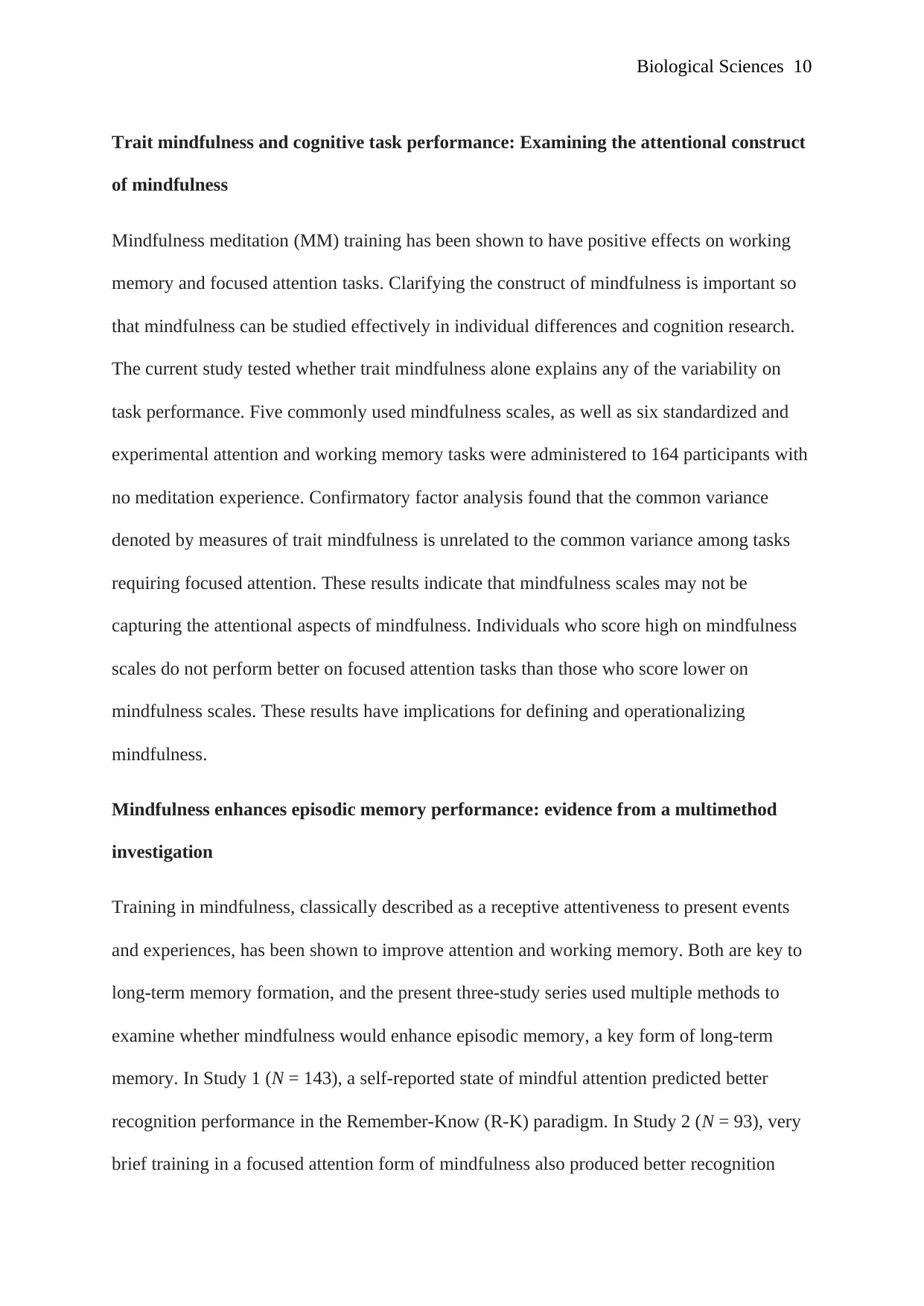
Biological Sciences 10
Trait mindfulness and cognitive task performance: Examining the attentional construct
of mindfulness
Mindfulness meditation (MM) training has been shown to have positive effects on working
memory and focused attention tasks. Clarifying the construct of mindfulness is important so
that mindfulness can be studied effectively in individual differences and cognition research.
The current study tested whether trait mindfulness alone explains any of the variability on
task performance. Five commonly used mindfulness scales, as well as six standardized and
experimental attention and working memory tasks were administered to 164 participants with
no meditation experience. Confirmatory factor analysis found that the common variance
denoted by measures of trait mindfulness is unrelated to the common variance among tasks
requiring focused attention. These results indicate that mindfulness scales may not be
capturing the attentional aspects of mindfulness. Individuals who score high on mindfulness
scales do not perform better on focused attention tasks than those who score lower on
mindfulness scales. These results have implications for defining and operationalizing
mindfulness.
Mindfulness enhances episodic memory performance: evidence from a multimethod
investigation
Training in mindfulness, classically described as a receptive attentiveness to present events
and experiences, has been shown to improve attention and working memory. Both are key to
long-term memory formation, and the present three-study series used multiple methods to
examine whether mindfulness would enhance episodic memory, a key form of long-term
memory. In Study 1 (N = 143), a self-reported state of mindful attention predicted better
recognition performance in the Remember-Know (R-K) paradigm. In Study 2 (N = 93), very
brief training in a focused attention form of mindfulness also produced better recognition
Trait mindfulness and cognitive task performance: Examining the attentional construct
of mindfulness
Mindfulness meditation (MM) training has been shown to have positive effects on working
memory and focused attention tasks. Clarifying the construct of mindfulness is important so
that mindfulness can be studied effectively in individual differences and cognition research.
The current study tested whether trait mindfulness alone explains any of the variability on
task performance. Five commonly used mindfulness scales, as well as six standardized and
experimental attention and working memory tasks were administered to 164 participants with
no meditation experience. Confirmatory factor analysis found that the common variance
denoted by measures of trait mindfulness is unrelated to the common variance among tasks
requiring focused attention. These results indicate that mindfulness scales may not be
capturing the attentional aspects of mindfulness. Individuals who score high on mindfulness
scales do not perform better on focused attention tasks than those who score lower on
mindfulness scales. These results have implications for defining and operationalizing
mindfulness.
Mindfulness enhances episodic memory performance: evidence from a multimethod
investigation
Training in mindfulness, classically described as a receptive attentiveness to present events
and experiences, has been shown to improve attention and working memory. Both are key to
long-term memory formation, and the present three-study series used multiple methods to
examine whether mindfulness would enhance episodic memory, a key form of long-term
memory. In Study 1 (N = 143), a self-reported state of mindful attention predicted better
recognition performance in the Remember-Know (R-K) paradigm. In Study 2 (N = 93), very
brief training in a focused attention form of mindfulness also produced better recognition
Paraphrase This Document
Need a fresh take? Get an instant paraphrase of this document with our AI Paraphraser
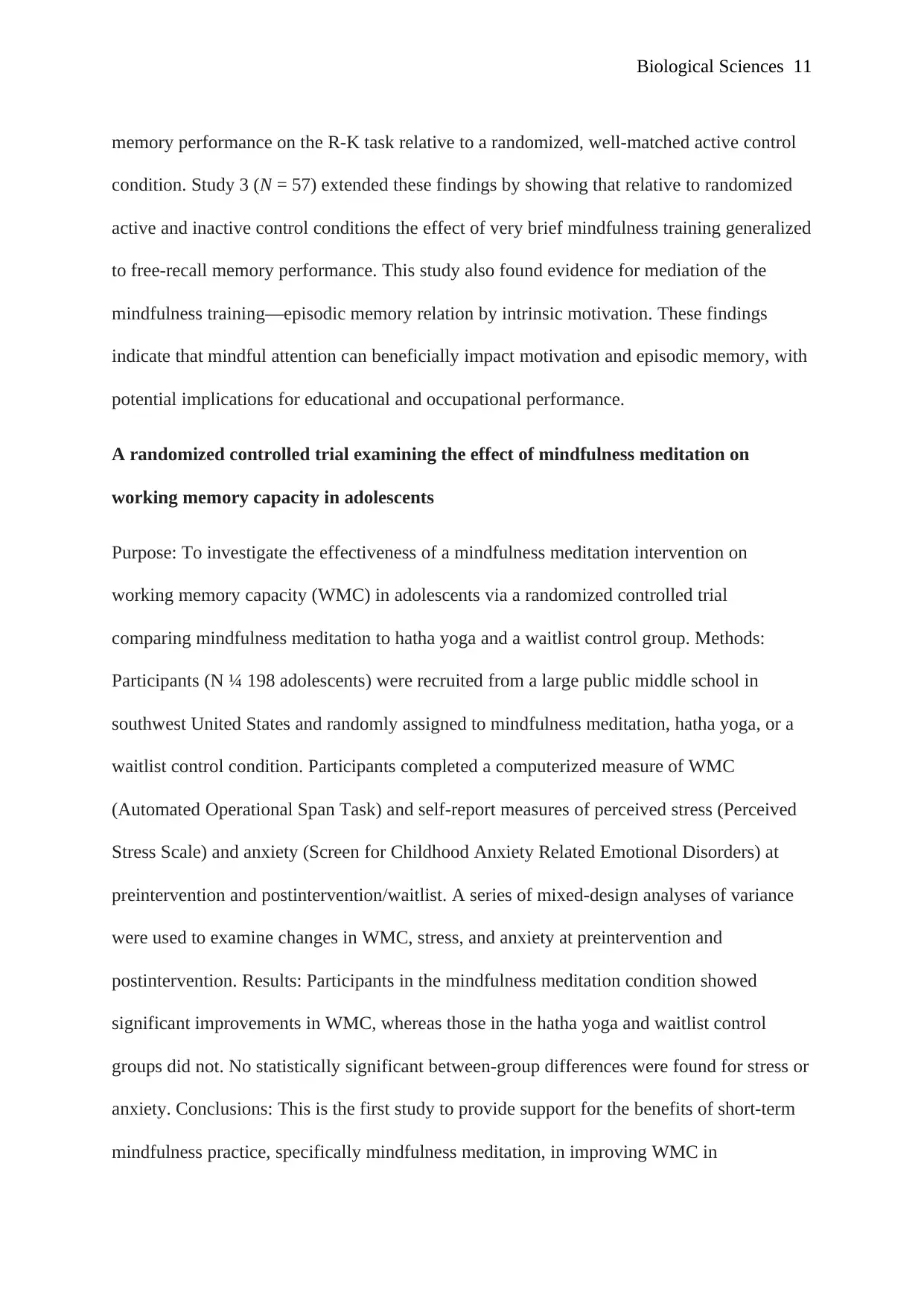
Biological Sciences 11
memory performance on the R-K task relative to a randomized, well-matched active control
condition. Study 3 (N = 57) extended these findings by showing that relative to randomized
active and inactive control conditions the effect of very brief mindfulness training generalized
to free-recall memory performance. This study also found evidence for mediation of the
mindfulness training—episodic memory relation by intrinsic motivation. These findings
indicate that mindful attention can beneficially impact motivation and episodic memory, with
potential implications for educational and occupational performance.
A randomized controlled trial examining the effect of mindfulness meditation on
working memory capacity in adolescents
Purpose: To investigate the effectiveness of a mindfulness meditation intervention on
working memory capacity (WMC) in adolescents via a randomized controlled trial
comparing mindfulness meditation to hatha yoga and a waitlist control group. Methods:
Participants (N ¼ 198 adolescents) were recruited from a large public middle school in
southwest United States and randomly assigned to mindfulness meditation, hatha yoga, or a
waitlist control condition. Participants completed a computerized measure of WMC
(Automated Operational Span Task) and self-report measures of perceived stress (Perceived
Stress Scale) and anxiety (Screen for Childhood Anxiety Related Emotional Disorders) at
preintervention and postintervention/waitlist. A series of mixed-design analyses of variance
were used to examine changes in WMC, stress, and anxiety at preintervention and
postintervention. Results: Participants in the mindfulness meditation condition showed
significant improvements in WMC, whereas those in the hatha yoga and waitlist control
groups did not. No statistically significant between-group differences were found for stress or
anxiety. Conclusions: This is the first study to provide support for the benefits of short-term
mindfulness practice, specifically mindfulness meditation, in improving WMC in
memory performance on the R-K task relative to a randomized, well-matched active control
condition. Study 3 (N = 57) extended these findings by showing that relative to randomized
active and inactive control conditions the effect of very brief mindfulness training generalized
to free-recall memory performance. This study also found evidence for mediation of the
mindfulness training—episodic memory relation by intrinsic motivation. These findings
indicate that mindful attention can beneficially impact motivation and episodic memory, with
potential implications for educational and occupational performance.
A randomized controlled trial examining the effect of mindfulness meditation on
working memory capacity in adolescents
Purpose: To investigate the effectiveness of a mindfulness meditation intervention on
working memory capacity (WMC) in adolescents via a randomized controlled trial
comparing mindfulness meditation to hatha yoga and a waitlist control group. Methods:
Participants (N ¼ 198 adolescents) were recruited from a large public middle school in
southwest United States and randomly assigned to mindfulness meditation, hatha yoga, or a
waitlist control condition. Participants completed a computerized measure of WMC
(Automated Operational Span Task) and self-report measures of perceived stress (Perceived
Stress Scale) and anxiety (Screen for Childhood Anxiety Related Emotional Disorders) at
preintervention and postintervention/waitlist. A series of mixed-design analyses of variance
were used to examine changes in WMC, stress, and anxiety at preintervention and
postintervention. Results: Participants in the mindfulness meditation condition showed
significant improvements in WMC, whereas those in the hatha yoga and waitlist control
groups did not. No statistically significant between-group differences were found for stress or
anxiety. Conclusions: This is the first study to provide support for the benefits of short-term
mindfulness practice, specifically mindfulness meditation, in improving WMC in
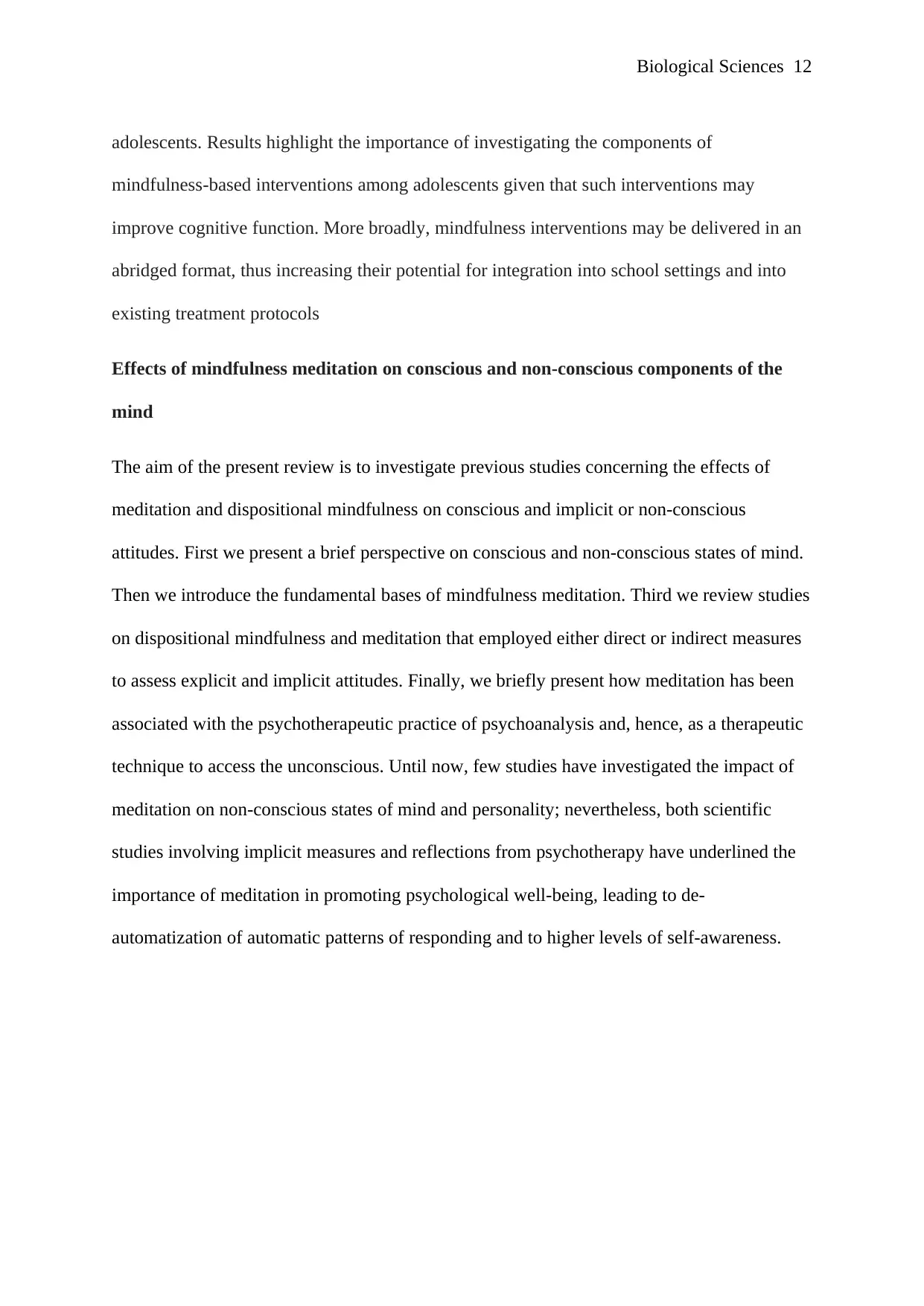
Biological Sciences 12
adolescents. Results highlight the importance of investigating the components of
mindfulness-based interventions among adolescents given that such interventions may
improve cognitive function. More broadly, mindfulness interventions may be delivered in an
abridged format, thus increasing their potential for integration into school settings and into
existing treatment protocols
Effects of mindfulness meditation on conscious and non-conscious components of the
mind
The aim of the present review is to investigate previous studies concerning the effects of
meditation and dispositional mindfulness on conscious and implicit or non-conscious
attitudes. First we present a brief perspective on conscious and non-conscious states of mind.
Then we introduce the fundamental bases of mindfulness meditation. Third we review studies
on dispositional mindfulness and meditation that employed either direct or indirect measures
to assess explicit and implicit attitudes. Finally, we briefly present how meditation has been
associated with the psychotherapeutic practice of psychoanalysis and, hence, as a therapeutic
technique to access the unconscious. Until now, few studies have investigated the impact of
meditation on non-conscious states of mind and personality; nevertheless, both scientific
studies involving implicit measures and reflections from psychotherapy have underlined the
importance of meditation in promoting psychological well-being, leading to de-
automatization of automatic patterns of responding and to higher levels of self-awareness.
adolescents. Results highlight the importance of investigating the components of
mindfulness-based interventions among adolescents given that such interventions may
improve cognitive function. More broadly, mindfulness interventions may be delivered in an
abridged format, thus increasing their potential for integration into school settings and into
existing treatment protocols
Effects of mindfulness meditation on conscious and non-conscious components of the
mind
The aim of the present review is to investigate previous studies concerning the effects of
meditation and dispositional mindfulness on conscious and implicit or non-conscious
attitudes. First we present a brief perspective on conscious and non-conscious states of mind.
Then we introduce the fundamental bases of mindfulness meditation. Third we review studies
on dispositional mindfulness and meditation that employed either direct or indirect measures
to assess explicit and implicit attitudes. Finally, we briefly present how meditation has been
associated with the psychotherapeutic practice of psychoanalysis and, hence, as a therapeutic
technique to access the unconscious. Until now, few studies have investigated the impact of
meditation on non-conscious states of mind and personality; nevertheless, both scientific
studies involving implicit measures and reflections from psychotherapy have underlined the
importance of meditation in promoting psychological well-being, leading to de-
automatization of automatic patterns of responding and to higher levels of self-awareness.
⊘ This is a preview!⊘
Do you want full access?
Subscribe today to unlock all pages.

Trusted by 1+ million students worldwide
1 out of 12
Your All-in-One AI-Powered Toolkit for Academic Success.
+13062052269
info@desklib.com
Available 24*7 on WhatsApp / Email
![[object Object]](/_next/static/media/star-bottom.7253800d.svg)
Unlock your academic potential
Copyright © 2020–2026 A2Z Services. All Rights Reserved. Developed and managed by ZUCOL.